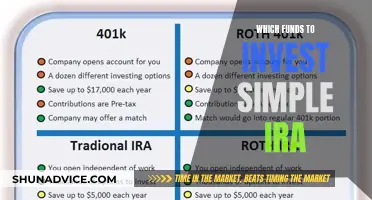
A health savings account (HSA) is a tax-advantaged account that allows you to pay current medical bills, save for future medical expenses, and invest in a variety of stocks, bonds, and mutual funds. HSAs offer a triple tax benefit: contributions are tax-deductible, investment growth is tax-free, and withdrawals for qualified medical expenses are also tax-free. This makes HSAs an attractive option for those looking to save for future health care costs or boost their retirement funds. When investing in an HSA, individuals can choose from a range of options, including low-risk, low-return choices such as money market funds, as well as higher-return, higher-risk choices such as stocks and mutual funds. By taking advantage of the investment opportunities available through HSAs, individuals can maximize the benefits of the account and effectively plan for their future health care and financial needs.
What You'll Learn

HSA funds can be used to invest in a variety of stocks, bonds, and mutual funds
A Health Savings Account (HSA) is a tax-advantaged account that allows you to pay current medical bills, save for future medical expenses, and invest in a variety of stocks, bonds, and mutual funds. The money you invest in your HSA is not taxed, which means it can grow faster than by saving alone.
When you invest in an HSA, you can choose from a variety of options, including stocks, bonds, mutual funds, and ETFs. Some HSAs offer tools to help you choose your investments and provide automatic rebalancing to maintain your preferred allocation. Others allow you to select specific investments.
If you keep a small balance in your HSA or plan to use it regularly, low-risk, low-return options such as money market funds may be a good choice. On the other hand, if you don't anticipate many medical expenses in the coming years, investing in stocks may be a better option for growing your HSA value.
- Index funds: These funds allow you to invest in a diversified group of stocks that track indexes like the S&P 500 or Russell 2000. They have low fees, so more of your returns go to you.
- Dividend funds: These funds invest in companies that pay dividends, which are typically profitable and established. You won't be taxed on the dividends, and you can reinvest or hold them as cash in your account.
- Individual stocks: This is a riskier approach where you invest in a small number of individual stocks. While it can provide higher returns, the risk is also higher if your choices don't perform well.
By investing your HSA funds, you can take advantage of the account's triple tax benefits and potentially grow your savings for future medical or retirement expenses.
Maximizing Cigna HSA Investment: A Guide to Smart Savings
You may want to see also

HSA funds grow tax-free
A Health Savings Account (HSA) is a tax-advantaged account that allows you to pay current bills, save for future medical expenses, and invest in a variety of stocks, bonds, and mutual funds. HSAs offer a triple tax benefit: tax-free contributions, tax-free growth, and tax-free withdrawals for qualified medical expenses. This means that any interest or earnings on your HSA funds are tax-free, allowing your funds to grow faster over time.
Here's how it works:
Tax-Free Contributions
HSA contributions are made with pre-tax dollars, which means that no taxes are withheld from HSA contributions made through payroll deductions. As a result, every dollar you contribute from your paycheck goes directly into your account, giving you more money to use on qualified health expenses compared to using funds from a checking or savings account.
Tax-Free Growth
Any interest or earnings on your HSA account are tax-free. This means that you can grow your HSA funds through interest and investing without being subject to taxes. There is no expiration date or required minimum distribution for HSAs, allowing you to spend years growing your funds tax-free.
Tax-Free Withdrawals
Withdrawals from your HSA for qualified medical expenses are also tax-free. This includes deductibles, copays, prescriptions, vision, and dental care. Your HSA funds are not taxed as long as they are used for eligible medical expenses.
By taking advantage of the triple tax benefit of HSAs, you can maximize your savings and grow your funds faster to prepare for short- and long-term healthcare expenses.
Small-Cap Mutual Funds: Strategies for Smart Investing
You may want to see also

HSA funds can be withdrawn tax-free for qualified medical expenses
Health savings accounts (HSAs) are a great way to save for future medical expenses. They are also a good option for those who want to give their retirement funds a boost. HSAs come with a triple tax benefit. Firstly, contributions to HSAs are tax-deductible, with individuals able to contribute up to a certain amount each year. Secondly, any earnings on the account remain tax-free as long as the money is used for qualified medical expenses. Finally, HSA funds can be withdrawn tax-free at any time to pay for qualified medical expenses.
The money in your HSA can be used to pay for a variety of medical expenses, including deductibles, copayments, doctor's visits, mental health services, eye care, dental expenses, and more. It's important to note that if you spend your HSA money on non-qualified expenses, you may be charged a penalty in addition to income taxes on the withdrawal. However, once you reach the age of 65, this penalty no longer applies, and you can use your HSA funds for any reason, although you will be required to pay ordinary income tax on the withdrawal.
The triple tax benefit of HSAs makes them attractive savings options, especially for those looking to save for future health-related costs. By taking advantage of the tax benefits offered by HSAs, you can maximize the benefits of your account and effectively plan for future medical or retirement expenses.
Choosing a Fund: Key Factors for Investment Success
You may want to see also

HSA funds can be rolled over from year to year
A health savings account (HSA) is a great way to save for future medical expenses or boost your retirement funds. HSAs have a triple tax benefit, and the money in the account can be used to pay for qualified medical expenses. The best part is that HSA funds can be rolled over from year to year. This means that you don't have to worry about spending the money in your HSA within a specific time frame. It is yours to keep and can be carried over from one year to the next.
The ability to roll over HSA funds provides a great opportunity to invest and grow your money over time. Unlike flexible spending accounts (FSAs), which have a "use it or lose it" feature, HSA funds do not expire if you don't spend them during the year. This makes HSAs an attractive option for those looking for a tax-advantaged way to save for medical expenses.
When it comes to rolling over HSA funds, there are a few things to keep in mind. First, make sure that you only spend your HSA funds on qualified medical expenses. If you use the funds for non-qualified expenses, you may be subject to a 20% penalty and additional taxes. The IRS defines qualified medical expenses as costs related to the prevention of physical or mental illness, including things like copays for prescription medications and office visits.
Another thing to consider is that you can only roll over HSA funds once every 12 months. If you have multiple HSA accounts, you may want to consolidate them to simplify your finances and reduce fees. You can do this by initiating an HSA account rollover, which involves closing one account and transferring the funds to another. Keep in mind that there may be fees associated with transferring or closing your HSA account, so be sure to review the potential monetary implications before making any changes.
In conclusion, HSA funds can be rolled over from year to year, providing a great opportunity to save for future medical expenses or boost your retirement funds. By taking advantage of the tax benefits and investment options offered by HSAs, you can make the most of your savings and have peace of mind knowing that your medical expenses are covered.
Index Funds: Liquid Assets or Long-Term Commitment?
You may want to see also

HSA funds can be used as an additional retirement savings account
A health savings account (HSA) is a great tool to help you prepare for future health care costs and retirement. It can also help you save on taxes.
Triple Tax Advantage
HSAs offer a triple tax benefit that makes them attractive savings options. Contributions to HSAs are tax-deductible, with individuals able to contribute $4,150 in 2024 and families able to put in $8,300. Those aged 55 and older can contribute an additional $1,000 as a catch-up contribution. Any earnings on the account remain tax-free as long as the money is used for qualified medical expenses, and the money can be withdrawn tax-free at any time to pay for these expenses.
Rollover Benefits
Unlike flexible spending accounts (FSAs), HSA funds can be rolled over from year to year. This means you don't have to worry about spending the money within a specific time frame.
Investment Opportunities
Once your HSA reaches a certain designated balance, typically $2,000, you may choose to invest a portion of your HSA dollars. You can invest in a variety of stocks, bonds, and mutual funds. This allows your money to grow faster than by saving alone.
Additional Retirement Income
Even if you don't have an HSA, it may be prudent to set aside certain assets just to pay for health care in retirement. On average, a 65-year-old individual may need $165,000 in after-tax savings to cover health care expenses. By using an HSA, you can boost your retirement income and avoid dipping into retirement accounts intended for cost-of-living expenses.
Long-Term Care Expenses
You can use your HSA to cover part of the cost of a "tax-qualified" long-term care insurance policy. You can do this at any age, but the amount you can use increases as you get older.
Estate Planning
In the event that your medical expenses are much lower than average, or you don't live as long as expected, you may have money in your HSA that you can pass along to your heirs. If your spouse is the designated beneficiary, the HSA will be treated as their HSA after your death, with the same triple-tax-free treatment.
Ginnie Mae Funds: A Smart Investment Strategy
You may want to see also
Frequently asked questions
A Health Savings Account (HSA) is a tax-advantaged account that allows you to pay current medical bills, save for future medical expenses, and invest in a variety of stocks, bonds, and mutual funds. To be eligible for an HSA, you must be enrolled in a high-deductible health plan (HDHP) and not be enrolled in Medicare or claimed as a dependent on someone else's tax return.
HSAs offer a triple tax advantage. Contributions to an HSA are tax-deductible, investment growth is tax-free, and withdrawals are tax-free when used for qualified medical expenses. This makes HSAs an attractive savings option for individuals and families.
You can start by determining your "cash target", or the amount of cash you want to keep in your HSA to pay for near-term medical expenses. Once you know this amount, you can invest the remaining funds in stocks, bonds, mutual funds, or other investment options. You can also use a robo-advisor, which will select investments on your behalf based on your risk tolerance and time horizon.
Here are some recommended funds to consider, depending on your investment goals and risk tolerance:
- Vanguard Total Stock Market Index Fund Admiral Shares (VTSAX)
- Vanguard Wellington Fund Investor Shares (VWELX)
- Fidelity 500 Index Fund (FXAIX)
- Schwab Target 2050 Index Fund (SWYMX)
- Schwab Value Advantage Money Fund - Investor Shares (SWVXX)
- Fidelity Short-Term Bond Fund (FSHBX)







